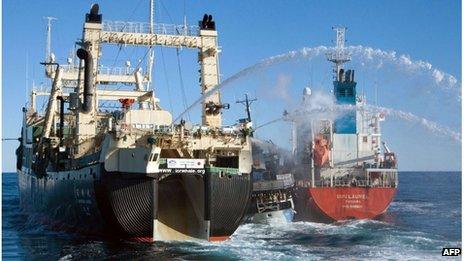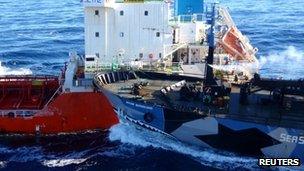US court brands whale activists Sea Shepherd 'pirates'
- Published

Both sides have accused each other of deliberately ramming ships
A court in the US has labelled conservationist group Sea Shepherd "pirates".
Judge Alex Kozinski said the group's "aggressive and high-profile attacks" on Japan's whaling fleet endangered lives, ordering them to stop.
US-based Sea Shepherd has for many years chased the Japanese whalers, attempting to disrupt the annual hunt.
The two sides have frequently clashed at sea, blaming each other for collisions and damage.
Three Sea Shepherd ships have been involved a stand-off and clashes with the whaling fleet in the icy waters of the Southern Ocean for several weeks.
They have been trying to prevent the Japanese ships from refuelling from a tanker ship, the Sun Laurel. Both parties released video footage this week which they said showed the other deliberately ramming their ships.
Sea Shepherd has also accused the whalers of using water cannon and stun grenades against them, and says Japan has deployed a military icebreaker, the Shirase, to intimidate them - something Japan rejects.
'Embodiment of piracy'
The 9th US Circuit Court of Appeals issued an injunction last year banning Sea Shepherd from going within 500m of Japan's ships.
Its ruling on Monday, external clears the way for Japan, which calls the activists terrorists, to launch more extensive legal action against them.
Judge Kozinski overturned an earlier district court ruling which had sided with the activists.
"When you ram ships, hurl glass containers of acid, drag metal-reinforced ropes in the water to damage propellers and rudders, launch smoke bombs and flares with hooks; and point high-powered lasers at other ships, you are, without a doubt, a pirate," he said.
"The activities that Cetacean [the Japanese whalers] alleges Sea Shepherd has engaged in are clear instances of violent acts for private ends, the very embodiment of piracy."

Japan says the Sea Shepherd ships are endangering lives at sea (Image by ICR)
He added that the illegality of whaling in Australian waters did not excuse Sea Shepherd's activities.
"It is for Australia, not Sea Shepherd, to police Australia's court orders."
Sea Shepherd argues that the US court has no jurisdiction over foreign-flagged vessels sailing in Australian waters with an international crew.
There has been an international ban on commercial whaling for 25 years, but Japan sends its fleet to the Antarctic in the autumn or winter each year, returning the following spring, with the aim of catching hundreds of whales.
Tokyo says the hunt is part of a scientific research programme and that it is obliged by the whaling treaty to sell meat by-products. But critics say the hunt is commercial whaling in another guise and has no scientific value.
Australia is also taking legal action against Japan over whaling.
But Japan's fisheries minister, Yoshimasa Hayashi, has said whaling is part of Japan's culture and that it will never give up hunting the animals.
"Japan is an island nation surrounded by the sea, so taking some good protein from the ocean is very important. For food security I think it's very important," he told AFP.
"So why don't we at least agree to disagree? We have this culture and you don't have that culture... so I just would like to say 'please understand this is our culture'."
- Published20 February 2013
- Published19 December 2012
- Published14 May 2012
- Published2 July 2012
- Published9 March 2012